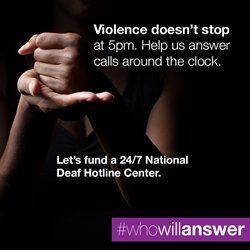Deaf, Deaf-Blind, Hard of Hearing Domestic Violence Survivors Hotline
Author: Communication Service for the Deaf
Published: 2014/12/02 - Updated: 2020/11/15
Category Topic: Communication - Related Publications
Page Content: Synopsis - Introduction - Main
Synopsis: CSD, ADWAS and the national coalition are committed to ensuring every deaf, deaf-blind and hard of hearing survivor has access to a deaf advocate who is able to communicate with them directly in American Sign Language. Domestic violence is a hidden issue within the deaf, deaf-blind and hard of hearing community.
Introduction
Communication Service for the Deaf, Inc. (CSD) has partnered with Abused Deaf Women's Advocacy Services (ADWAS) to expand and enhance access to linguistically and culturally appropriate resources for deaf, deaf-blind and hard of hearing domestic violence and sexual assault survivors.
Main Content
The mission includes leading a coalition of over a dozen community organizations currently serving this population and launching a #WhoWillAnswer crowd-funding campaign. The goal is to raise $250,000 to fully fund the National Deaf Hotline Center, as well as increase and raise awareness of advocacy resources currently available.
ADWAS is the first deaf-led community service organization established to help deaf, deaf-blind and hard of hearing survivors of domestic violence. Among the services they provide is the National Deaf Hotline Center, which is staffed by deaf advocates who are trained to help deaf, deaf-blind and hard of hearing domestic violence survivors gain access to critical information and resources, communicating with them in their native American Sign Language (ASL).

Due to limited funding, the center currently operates only Monday through Friday from 9 a.m. to 5 p.m. (PST). This leaves deaf survivors without access to services from qualified deaf advocates during weekday evenings and weekends. In those instances, deaf callers must instead involve an ASL interpreter to relay phone calls to the hearing advocates at the National Domestic Violence Hotline. Although the hearing advocates are fully trained in dealing with survivors, these conversations are deeply personal, and a three-way call through a sign language interpreter is often not the optimal communication choice.
"The trauma of violence for deaf survivors can be isolating, but it doesn't have to be," said Tiffany S. Williams, ADWAS Executive Director. "Our goal of having a 24/7 hotline led by deaf advocates will provide the needed support for survivors, friends, family and service providers to break down the barriers that deaf survivors face."
"Domestic violence is a hidden issue within the deaf, deaf-blind and hard of hearing community. Because deaf and hard of hearing survivors do not have equal access to information, there are greater external factors that prevent them from being able to escape abusive relationships," said Christopher Soukup, CEO of CSD. "That is why we support community-based organizations that serve deaf, deaf-blind and hard of hearing survivors of domestic violence and sexual assault. We believe now is the time to ensure that every deaf, deaf-blind and hard of hearing survivor gets full access to resources and information. With the #WhoWillAnswer campaign, we can make that happen."
CSD, ADWAS and the national coalition are committed to ensuring every deaf, deaf-blind and hard of hearing survivor has access to a deaf advocate who is able to communicate with them directly in American Sign Language - whenever they need help or wherever they experience violence. To join the #WhoWillAnswer campaign, visit www.whowillanswer.org or send an email to contact@whowillanswer.org
Communication Service for the Deaf, Inc.
Communication Service for the Deaf, Inc. was established in 1975, primarily to provide sign language interpreting services to deaf and hard of hearing adults in South Dakota. Today, CSD is an international organization that employs nearly 1,000 individuals in offices across the world, providing a broad continuum of social and human services programs, as well as telecommunications relay services. The largest deaf-led nonprofit in the United States, CSD has helped fund over 50 community organizations and events throughout the nation in the past year, giving nearly $130,000 in support of deaf community causes. CSD is a private nonprofit agency dedicated to providing quality services; ensuring public accessibility; and increasing awareness of issues affecting the deaf, hard of hearing and individuals with speech disabilities. For more information, please visit www.csd.org
Abused Deaf Women's Advocacy Services
Founded in 1986 and located in Seattle, Washington, Abused Deaf Women's Advocacy Services provides comprehensive services to deaf and deaf-blind victims/survivors of sexual assault, domestic violence and stalking. ADWAS is striving towards a healthy community that is free of violence and oppression and established the nation's first supportive housing program for deaf and deaf-blind survivors: A Place of Our Own. It is committed to providing accessible and safe housing for deaf and deaf-blind women and their children. There have been 42 deaf communities across the United States that received training using the ADWAS model. For more information, visit www.adwas.org
Attribution/Source(s): This quality-reviewed publication was selected for publishing by the editors of Disabled World (DW) due to its relevance to the disability community. Originally authored by Communication Service for the Deaf and published on 2014/12/02, this content may have been edited for style, clarity, or brevity.